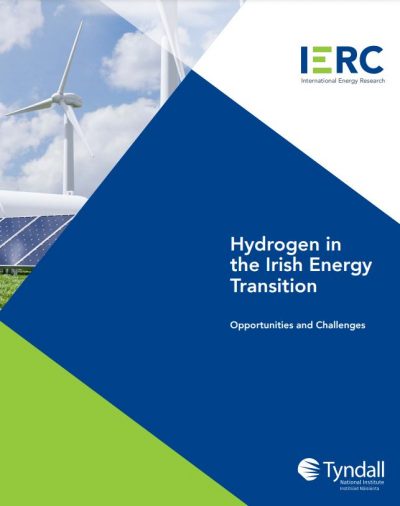 The Irish Government’s Climate Action Plan, which sets out ambitious targets for decarbonisation across the energy, transport, heating and agriculture sectors. The Climate Action Plan is supported by the Climate Act 2021, which committed Ireland to a legally binding target of net-zero greenhouse gas emissions no later than 2050, and a reduction of 51% by 2030.
The Irish Government’s Climate Action Plan, which sets out ambitious targets for decarbonisation across the energy, transport, heating and agriculture sectors. The Climate Action Plan is supported by the Climate Act 2021, which committed Ireland to a legally binding target of net-zero greenhouse gas emissions no later than 2050, and a reduction of 51% by 2030.
Achieving the targets set out in the Climate Action Plan, cost effectively, safely and reliably, will be challenging and are likely to require changes in how society operates and the introduction of new technologies which today are considered uneconomic. For example, in order to achieve a target of 80% renewable electricity will require at least a trebling in installed capacity of our wind fleet with offshore wind a key component of this expansion. Wind at this level will produce more than enough electrical energy to power the equivalent of every home in the country however utilising the energy that is produced at the correct time will be challenging. To achieve this, we will need to make the best use of all available resources connected to the energy system and it will be essential to be able to move in time or location, energy consumption or generation to balance supply and demand.
Storing energy in the form of hydrogen produced by renewable electricity is seen by many as a key enabler of these targets. However, the use of hydrogen goes beyond its use as storage or a replacement for fossil fuel-based power plant. It also has been shown to have potential to decarbonise other difficult to decarbonise industries such as heat, transport (particularly heavy goods vehicles) and industrial processes.
The large-scale use of hydrogen in an energy system to enable the decarbonisation of a country’s energy system has not been attempted or achieved anywhere in the world. Challenges exist with respect to the cost effective and safe production, storage, transportation, and consumption of hydrogen but many of these are being currently addressed by the market and with innovative technology. Therefore, the state-of-the-art is in constant advancement from multiple areas of the hydrogen eco-system.
This report summarises the research conducted at IERC to seek the evidence and information on options for addressing these barriers and opportunities that hydrogen presents to enable Ireland’s decarbonisation targets and potentially establish Ireland as a world leader in this technology. The paper delivers empirical evidence-based recommendations for policy considerations in hydrogen to the Department of Environment, Climate and Communications.
The findings and 13 key recommendations from the research supports much of the objectives and actions to be delivered through the National Hydrogen Strategy.
Recommendation 1: Continue to monitor and evaluate the use of green hydrogen in non-domestic transport applications.
Recommendation 2: Develop a framework to support for the development of dedicated renewable energy sources for green hydrogen production.
Recommendation 3: Develop a framework to support the development of green hydrogen production using curtailed renewable energy.
Recommendation 4: Introduce financial instruments and incentives to support the development of green hydrogen production in Ireland.
Recommendation 5: Demonstrate use of hydrogen as flexibility provider to perform power system balancing.
Recommendation 6: Evaluate the blending of hydrogen into the existing Irish gas network.
Recommendation 7: Evaluate the conversion of portions of the Irish gas network to pure hydrogen.
Recommendation 8: Determine whether low carbon hydrogen obtained using carbon capture and storage technologies applicable to geological basins and structures may be a practical pathway for Ireland.
Recommendation 9: Robustly evaluate feasibility of large-scale hydrogen storage in salt caverns.
Recommendation 10: Establish an appropriate greenhouse gas emissions standard for low carbon hydrogen that meets multiple relevant criteria.
Recommendation 11: Demonstrate storage and conversion technologies such as Power-to-Gas and Gas-to-Power conversion in microgrids.
Recommendation 12: Evaluate the production of low carbon ammonia using green hydrogen in Ireland.
Recommendation 13: Evaluate the costs of electrifying or using green hydrogen to decarbonise elements of the rail system.
The research project gathered information from the stakeholders of hydrogen in Ireland through a call for evidence which contributed the findings and the development of the report.
Read the full report here.
IERC Smart Energy Services and Regulatory Innovation team lead Dr Luciano de Tomassi said “Green hydrogen has tremendous potential to support the radical decarbonisation of the Irish economy. In the short to medium term green hydrogen is going to be expensive, therefore it is critical that its production, storage, distribution and final use are very carefully managed to ensure that it’s potential is maximised and that wasteful use of this resource is minimised”.
Paul McCormack, founding member of Hydrogen Ireland and leader of several international hydrogen projects including GenComm, H2AZEL and H2CAT, added that
“The report clearly identifies that the adoption and integration of hydrogen into existing Irish energy systems is a complex pathway that will require significant technological advancements, infrastructure development, and policy support. These processes will take time, making hydrogen an ‘evolutionary clean fuel’ in terms of its gradual and steady evolution rather than a rapid and immediate transformation. The challenges related to cost, efficiency, infrastructure, and market development contribute to this measured progression as Ireland seeks to create a just and equitable pathway to net zero.”